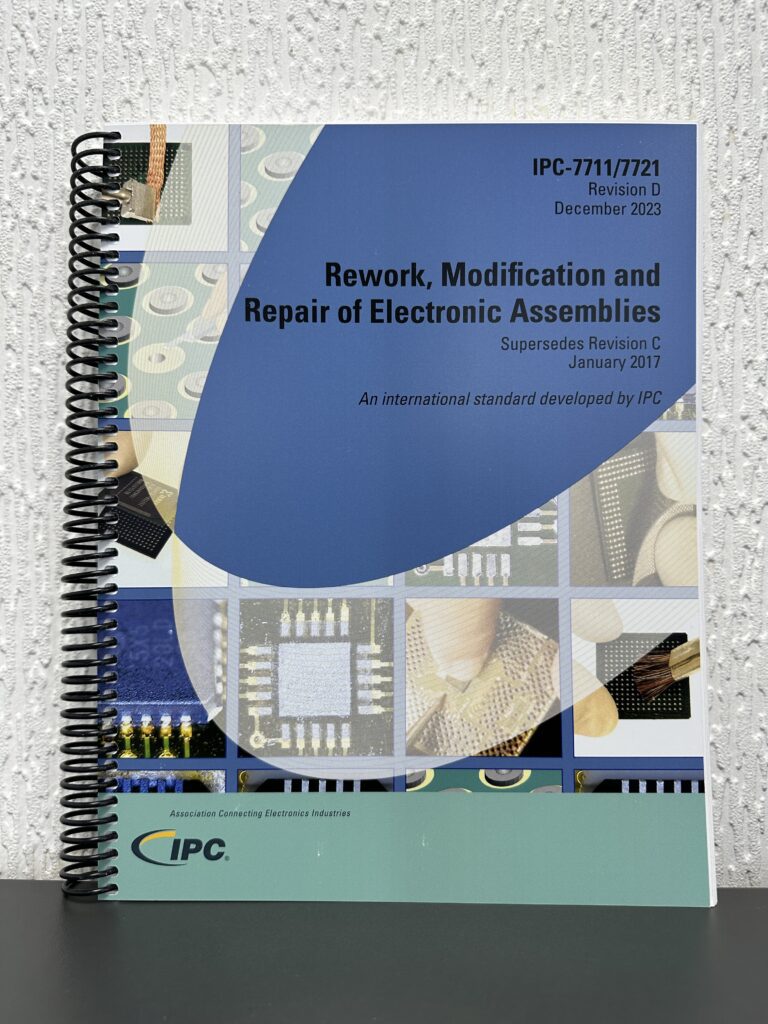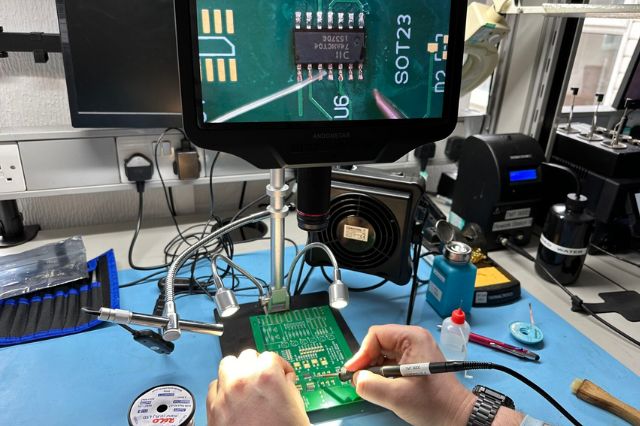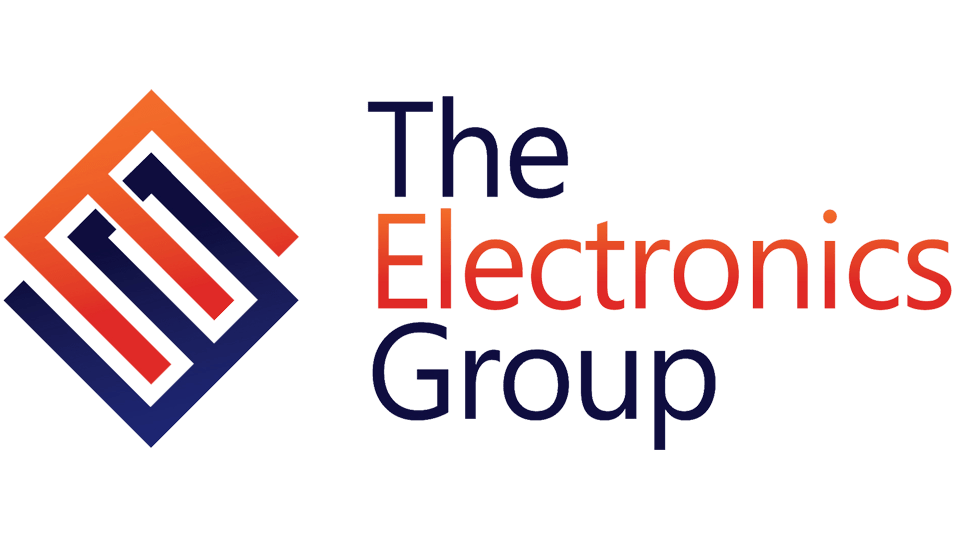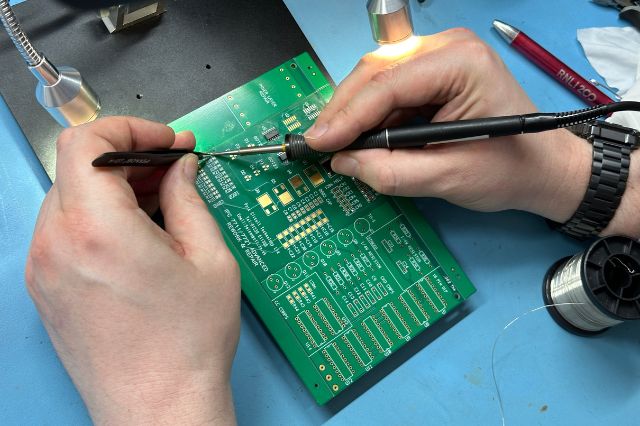The IPC rework standards or IPC 7711/7721 Rework, Modification and Repair of Electronic Assemblies standards as it is officially known, play a key role in ensuring professionals are able to rework, modify and repair electronic assemblies to the correct standards.
In this article we are going to explore the IPC 7711/7721 rework standards and certification in more depth. Covering what they are, why they are important to individuals and the industry as a whole and the certification process.
Jump straight into the details of the IPC 7711/7721 course!
What are the IPC 7711/7721 Rework Standards
The IPC 7711/7721 Rework, Modification and Repair of Electronic Assemblies standards are globally recognised guidelines that outline the standards for reworking, modifying, and repairing electronic assemblies. These standards provide detailed instructions on removing and replacing components, repairing circuitry, and modifying assemblies. All to meet specific requirements set out by IPC in classes 1, 2 and 3. By working to these standards, professionals ensure that electronic products maintain their integrity and functionality after undergoing rework or repair.
Manufacturers and service providers rely on the IPC 7711/7721 standards to train their staff, ensuring consistency and reliability in their processes. Adopting these standards helps businesses reduce errors, improve product quality, and enhance customer satisfaction. For professionals, being certified in IPC 7711/7721 demonstrates a thorough understanding of industry best practices.
The standards cover various aspects of electronic assembly rework and repair, including surface mount and through-hole component removal and replacement, conductor and laminate repair, and modifications to printed circuit boards. By mastering these procedures, professionals can effectively address defects, implement design changes, and extend the lifespan of electronic products.

The Certification Process for IPC 7711/7721
Obtaining IPC 7711/7721 certification involves a structured training program followed by assessments to evaluate proficiency. The training covers theoretical knowledge and practical skills, ensuring participants are well-equipped to apply the standards in real-world scenarios. Topics include Surface Mount Device and Plated through hole component removal, Chip and MELF rework and Printed wiring board circuit repair, all aligned with the IPC 7711/7721 standards.
In the UK, several accredited training providers offer IPC 7711/7721 certification courses. Here at The Electronics Group, we are the largest authorised training provider in the UK, with training centres in both Leeds and Cirencester.
Our IPC 7711/7721 courses are designed to cater to different levels of expertise, from beginners to experienced professionals seeking to update their skills. The duration of the course depends on the level at which you are being certified. For Certified IPC Specialist (CIS) level the course is 4 days and for both Certified Subject Expert (CSE) and Certified IPC Trainer (CIT) level the course is 5 days.
Upon completing each module, delegates must demonstrate their competence in applying the IPC rework standards and then complete an exam in order to receive their certification.
Maintaining Certification and Continuous Improvement
Achieving IPC 7711/7721 certification is a significant milestone, but maintaining it requires some ongoing effort. The certification is valid for 2 years, after which you are required to recertify. This process ensures that professionals stay current with industry standards and best practices.
Recertification often involves attending refresher courses and passing an updated exam. At The Electronics Group we offer convenient recertification courses tailored to working professionals.
Choosing the Right Training Provider to get IPC 7711/7721 Certified
Selecting the right training provider is the first step in the certification process. At The Electronics Group we have been delivering high quality IPC training for over 20 years, including the IPC 7711/7721 course. Our training courses combine theoretical knowledge with hands-on practice, ensuring delegates gain a thorough understanding of the standards and their application.
Our courses are delivered by experienced Master IPC Trainers who bring their real-world insights and experience into the classroom. This practical approach helps participants grasp more complex concepts and apply them effectively in their work. Additionally, we offer flexible training options, including a choice of location at either of our Leeds or Cirencester training centres or on-site training at your facility. We are also flexible with training dates to work around your busy schedules.
By choosing a reputable provider like The Electronics Group, delegates can be confident that the knowledge they gain will be up to date and their certification will be recognised and respected within the industry.
See more information on our IPC 7711/7721 training course here.

Benefits of IPC 7711/7721 Certification
Achieving IPC 7711/7721 certification offers numerous advantages for both professionals and businesses. For individuals, it signifies a high level of expertise in electronic assembly rework and repair, making them more competitive in the job market. Employers often prefer certified professionals, as it reduces the need for on-the-job training and ensures you are able to work to industry standards.
Businesses benefit from having certified staff as it leads to improved quality and reliability of their products. Adhering to IPC rework standards minimises errors and rework, leading to cost savings and enhanced customer satisfaction. Additionally, having certified staff can be a valuable marketing tool as it demonstrates a commitment to quality.
The Role of IPC 7711/7721 Certification in Career Advancement
For professionals in the electronics industry, IPC 7711/7721 certification is a valuable asset for career development. Employers recognise the certification as a mark of expertise and reliability. Holding this credential often opens doors to advanced roles and higher earning potential.
At The Electronics Group, our IPC 7711/7721 training programs are designed to help professionals achieve these career goals. Our tailored approach ensures delegates not only pass the certification exam but also gain practical skills that are immediately applicable in the workplace.
How IPC 7711/7721 Impacts the UK Electronics Industry
From the automotive to telecommunication, electronics play a critical role in various industries. The IPC 7711/7721 standards directly impact the quality and reliability of products, making them an essential part of the industry.
UK manufacturers and service providers rely heavily on skilled professionals who understand and apply IPC rework standards. These standards help ensure that reworked or repaired electronic assemblies meet the original specifications, preserving the integrity of the final product.
Master the IPC Rework Standards With The Electronics Group
Mastering IPC rework standards through IPC 7711/7721 certification is a significant achievement for electronics professionals.
The certification process, while thorough, is made accessible through expert training providers like our team at The Electronics Group. Our comprehensive courses and industry expertise equip delegates with the skills needed to succeed.
For those interested in taking the next step, take a closer look at the IPC 7711/7721 course details here or get in touch with our team to book your spot.


